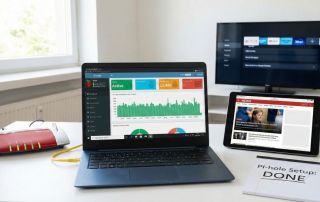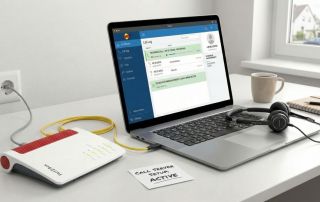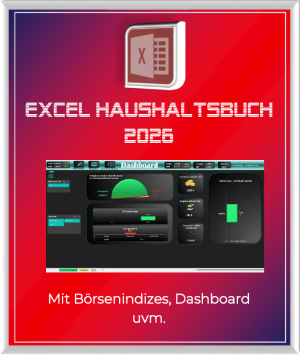Moving to a new PC with Windows
You probably also know the situation that you buy a new PC without an operating system (to save money), since you still have your Windows version for which has already been paid. Only if you then want to activate Windows on the new computer comes at once an error message that Windows is already activated on another PC.
So what to do?
First of all, it does not help to format the boot drive (mostly drive: C).

If you have already done that and are looking for another solution, unfortunately you have had bad luck.
Before you move to a new PC, you must log off or deactivate your Windows license from the old computer in order to make it available again.
By the way, it does not necessarily have to be that you are facing the problem if you have bought a new computer, but it can be enough if so-called system-relevant components are exchanged.
This is the same for Windows as if it were a completely new PC.
The system-relevant components include e.g. Mainboard, CPU, hard drive and in some cases, even the graphics card (albeit the exception) to be the trigger.
Moving to a new PC with Windows
You probably also know the situation that you buy a new PC without an operating system (to save money), since you still have your Windows version for which has already been paid. Only if you then want to activate Windows on the new computer comes at once an error message that Windows is already activated on another PC.
So what to do?
First of all, it does not help to format the boot drive (mostly drive: C).

If you have already done that and are looking for another solution, unfortunately you have had bad luck.
Before you move to a new PC, you must log off or deactivate your Windows license from the old computer in order to make it available again.
By the way, it does not necessarily have to be that you are facing the problem if you have bought a new computer, but it can be enough if so-called system-relevant components are exchanged.
This is the same for Windows as if it were a completely new PC.
The system-relevant components include e.g. Mainboard, CPU, hard drive and in some cases, even the graphics card (albeit the exception) to be the trigger.
1. Start Windows Command Prompt as administrator
1. Start Windows Command Prompt as administrator
First, you start your old computer quite normally.
Then go to the bottom left of the taskbar on the Windows icon and right-click once to open the options menu.
Select the item: “Command Prompt (Administrator)”.
This step is very important because if you choose only “Command Prompt” you will not have the required rights for the action you’ve planned, and the command would be denied.
see picture: (click to enlarge)
First, you start your old computer quite normally.
Then go to the bottom left of the taskbar on the Windows icon and right-click once to open the options menu.
Select the item: “Command Prompt (Administrator)”.
This step is very important because if you choose only “Command Prompt” you will not have the required rights for the action you’ve planned, and the command would be denied.
see picture:
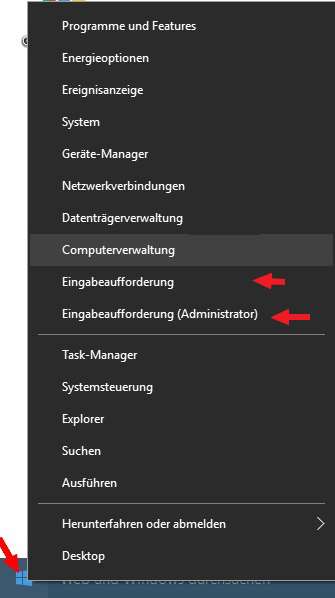
2. Disable Windows license
2. Disable Windows license
To deactivate the Windows license from your old computer, enter the following:
slmgr / upk
Then simply confirm with the Enter key and that’s it.
If you have entered the command correctly, you will receive a confirmation immediately.
see picture: (click to enlarge)
Now you can easily format your old hard drive, or install it in your new computer to use it even further.
If you come up with the idea to say:
“Why should not I just install the old hard drive in the new computer and use it as a system hard drive?”
Windows would not recognize the PC and issue the message that you should please activate your copy of Windows.
Which, of course, would not work in that case.
To deactivate the Windows license from your old computer, enter the following:
slmgr / upk
Then simply confirm with the Enter key and that’s it.
If you have entered the command correctly, you will receive a confirmation immediately.
see picture:
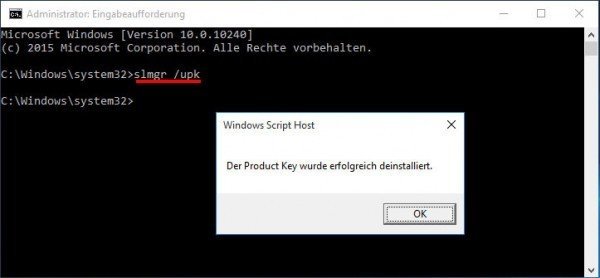
Now you can easily format your old hard drive, or install it in your new computer to use it even further.
If you come up with the idea to say:
“Why should not I just install the old hard drive in the new computer and use it as a system hard drive?”
Windows would not recognize the PC and issue the message that you should please activate your copy of Windows.
Which, of course, would not work in that case.
Popular Posts:
Ad-free home network: Install Pi-hole on Windows
Say goodbye to ads on smart TVs and in apps: Pi-hole software turns your Windows laptop into a network filter. This article explains step-by-step how to install it via Docker and configure the necessary DNS settings in your FRITZ!Box.
How to tune your FRITZ!Box into a professional call server
A professional telephone system can be built using a FRITZ!Box and a laptop. This article shows step by step how to use the free software "Phoner" to schedule announcements and record calls – including important legal information (§ 201 StGB).
Why to-do lists are a waste of time
Do you feel unproductive at the end of the day, even though you've worked hard? Your to-do list is to blame. It tempts you to focus on easy tasks and ignores your limited time. This article explains why lists are "self-deception" and why professionals use a calendar instead.
Smartphone Wi-Fi security: Public hotspots vs. home network
Is smartphone Wi-Fi a security risk? This article analyzes in detail threats such as evil twin attacks and explains protective measures for when you're on the go. We also clarify why home Wi-Fi is usually secure and how you can effectively separate your smart home from sensitive data using a guest network.
Warum dein Excel-Kurs Zeitverschwendung ist – was du wirklich lernen solltest!
Hand aufs Herz: Wann hast du zuletzt eine komplexe Excel-Formel ohne Googeln getippt? Eben. KI schreibt heute den Code für dich. Erfahre, warum klassische Excel-Trainings veraltet sind und welche 3 modernen Skills deinen Marktwert im Büro jetzt massiv steigern.
Cybersicherheit: Die 3 größten Fehler, die 90% aller Mitarbeiter machen
Hacker brauchen keine Codes, sie brauchen nur einen unaufmerksamen Mitarbeiter. Von Passwort-Recycling bis zum gefährlichen Klick: Wir zeigen die drei häufigsten Fehler im Büroalltag und geben praktische Tipps, wie Sie zur menschlichen Firewall werden.
Popular Posts:
Ad-free home network: Install Pi-hole on Windows
Say goodbye to ads on smart TVs and in apps: Pi-hole software turns your Windows laptop into a network filter. This article explains step-by-step how to install it via Docker and configure the necessary DNS settings in your FRITZ!Box.
How to tune your FRITZ!Box into a professional call server
A professional telephone system can be built using a FRITZ!Box and a laptop. This article shows step by step how to use the free software "Phoner" to schedule announcements and record calls – including important legal information (§ 201 StGB).
Why to-do lists are a waste of time
Do you feel unproductive at the end of the day, even though you've worked hard? Your to-do list is to blame. It tempts you to focus on easy tasks and ignores your limited time. This article explains why lists are "self-deception" and why professionals use a calendar instead.
Smartphone Wi-Fi security: Public hotspots vs. home network
Is smartphone Wi-Fi a security risk? This article analyzes in detail threats such as evil twin attacks and explains protective measures for when you're on the go. We also clarify why home Wi-Fi is usually secure and how you can effectively separate your smart home from sensitive data using a guest network.
Warum dein Excel-Kurs Zeitverschwendung ist – was du wirklich lernen solltest!
Hand aufs Herz: Wann hast du zuletzt eine komplexe Excel-Formel ohne Googeln getippt? Eben. KI schreibt heute den Code für dich. Erfahre, warum klassische Excel-Trainings veraltet sind und welche 3 modernen Skills deinen Marktwert im Büro jetzt massiv steigern.
Cybersicherheit: Die 3 größten Fehler, die 90% aller Mitarbeiter machen
Hacker brauchen keine Codes, sie brauchen nur einen unaufmerksamen Mitarbeiter. Von Passwort-Recycling bis zum gefährlichen Klick: Wir zeigen die drei häufigsten Fehler im Büroalltag und geben praktische Tipps, wie Sie zur menschlichen Firewall werden.

